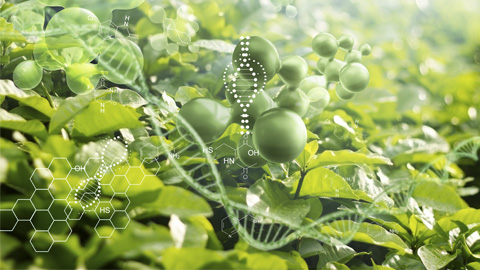The Earth BioGenome Project, closer to becoming a reality
The Earth BioGenome Project, which aims to sequence the genomes of all species of plants, animals, fungi, and microbial life on Earth, has now entered the large-scale production phase. Updates on the research and upcoming challenges were presented by the PNAS journal, in addition to a set of articles published by scientists from several institutions, including the UAB.

The Earth BioGenome Project (EBP) began in November 2018 and is one of the most important scientific projects currently taking place. The objective is to provide a complete catalogue of DNA sequencing of the 1.8 million species of plants, animals and fungi, as well as single cell eukaryotes.
The Earth is expected to lose 50% of its biodiversity at the end of this century if no actions are taken to stop climate change and protect the health of global ecosystems. The creation of a digital library of DNA sequencing of all eukaryotic species known to exist can help to create effective tools with which to prevent any more loss in biodiversity and the spreading of pathogens, to control and protect ecosystems, and to improve services for these ecosystems.
After a pilot phase, the project is now entering the large-scale production phase. The state of the research was presented in a collection of articles published in the scientific journal Proceedings of the National Academies of Science. The articles describe the objectives, the progress made up to date, and the next steps in the EBP project.
“These articles capture the essence and emotion of what represents the largest scale of coordinated effort we have seen in the history of biology”, affirms Harris Lewin, president of EBP and professor in Evolution and Ecology at the University of California, Davis (UC Davis).
Following the initial part of the phase, the objective of phase I, which will be met at the end of 2023, is to produce model genomes representing some 9,400 taxonomy groups. Until now, affiliated projects have produced some 200 of these genomes; it is expected that the sequencing, assembling and annotating of over 3,000 more will be completed at the end of 2022, thereby representing approximately one-third of the objective of phase I.
The DNA sequencing of genomes can be applied to "a large array of urgent global emergencies, such as preventing any further loss of biodiversity and adapting food crops to climate change". "The progress of EBP in the sequencing of eukaryotic life is humble and inspiring: reaching the ultimate goal of sequencing all of eukaryotic life now seems to be within our reach", Lewin concludes.
Taking part in the introductory article of the collection published in PNAS was Cristina Roquet, postdoctoral researcher at the UAB Department of Animal Biology, Plant Biology and Ecology (BABVE), and research collaborator at the Laboratoire d’Ecologie Alpine. “Projects such as the EBP make it clear that scientific collaborations are essential in overcoming the great challenges posed by today's climate emergence”, she points out.
Catalonia's Participation in the EBP
The EBP functions as an international network of networks, coordinating several specific efforts conducted in taxa or at regional and national levels, such as the Vertebrate Genome Project, the Darwin Tree of Life Project (Great Britain and Ireland) and the European Reference Genome Atlas (Europe). It includes 5,000 scientists and technicians from 44 member institutions in 22 different countries from all continents except Antartica, and contains 49 affiliated projects.
One of this network's first nodes, established in 2019, was the Catalan Initiative for the Earth Biogenome Project (CBP), launched by the Institute for Catalan Studies (IEC) and two of its subsidiary societies: the Catalan Biology Society (SCB) and the Catalan Institute for Natural History (ICHN), and Andorra Research + Innovation. It is formed by some 20 institutions and over 100 scientists.
The CBP aims to produce a detailed catalogue of the genome of eukaryotic species found in Catalan-speaking regions. At the moment, the team is sequencing some 50 genomes, the first of which, the Balearic shearwater, has already been completed. Montserrat Corominas, researcher at the University of Barcelona and coordinator of the CBP, announces that "the challenges now facing the CBP are finding the funding needed to accelerate the project's production phase and make it available to society as a whole".
The UAB's Contribution to the CBP
The UAB has contributed to the project since the beginning through the work of lecturer Jordina Belmonte, researcher at BABVE and ICTA-UAB and president of the ICHN. And also through the work of Cristina Roquet, who has shared her research expertise in the genome sequencing of alpine plants through activities organised by the CBP.
“The CBP project is open to all biodiversity and genome researchers of the UAB”, says Jordina Belmonte, and points out the importance of “everyone working together in collaboration and following the same standards worldwide, since this is what allows us to reach our global goal of sequencing all of the eukaryotic diversity existing on our planet”.
Original article: Harris A. Lewin et al. The Earth BioGenome Project 2020: Starting the clock. Proceedings of the National Academy of Sciences Jan 2022, 119 (4) e2115635118; DOI: 10.1073/pnas.2115635118
The UAB, with Sustainable Development Goals
Life on land
Life below water
Climate action